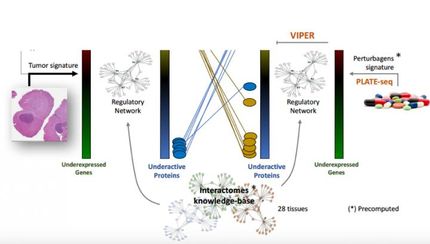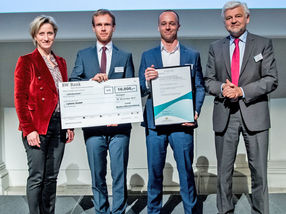EU rules are denying children latest cancer drugs
Children with cancer are being denied new, potentially life-saving drugs, because EU rules are allowing companies to trial some drugs only in adults, leading cancer experts warn.
Changes to how EU rules are implemented could allow children access to a goldmine of potential cancer drugs which have currently only been tested in adults – by making it more difficult for pharma companies to avoid testing them in under-18s too.
Under the current system, pharma companies often gain exemptions from carrying out expensive testing of cancer drugs in patients under the age of 18, even where a drug's mechanism of action suggests it could work in children.
As a result there are significant delays in new drugs becoming available for children, and some drugs may never be formally licensed for paediatric use.
The Institute of Cancer Research, London – one of the world's leading centres for research into paediatric cancers – today calls for urgent modifications to the current system to make sure pharma companies test more of their drugs in children.
The Institute of Cancer Research (ICR) is urging the EU to scrap the current system of waivers and exemptions which is preventing many drugs from reaching children, even when there is evidence that the drugs could be effective.
The ICR is pushing for the changes in collaboration with the European Consortium for Innovative Therapies for Children with Cancer (ITCC), based in France, and the two organisations have analysed data on the impact of current EU regulations.
Of 28 cancer drugs approved for adult marketing authorisation in Europe since 2007, 26 have a mechanism of action relevant for paediatric malignancies, but 14 have been waived from being tested in under-18s because the specific adult condition for which the drug is developed does not occur in children.
For example, drugs have been approved for treating adult cancers with mutations in the ALK or EGFR genes, but the manufacturers have been granted waivers from testing the drugs in children, even though ALK and EGFR mutations have been shown to play a role in some childhood cancers.
The analysis by the ICR and the ITCC also shows that the European Commission's alternative route for getting cancer drugs to children – its regulation on rare, or 'orphan', conditions – is failing to be effective. Of the 25 EU-approved orphan medicinal products for cancer, none were registered for children in a different cancer type to that in adults.
The ICR is calling for a change in the implementation of the 2007 European Union Regulation on Paediatric Medicine, originally designed to improve children's access to new treatments.
Specifically, the ICR wants the European Commission to refuse to grant waivers to pharmaceutical companies exempting them from testing cancer drugs in children on the basis that the adult cancer targeted does not occur in children.
These so-called 'class waivers' allow pharma companies to avoid the implementation of Paediatric Investigation Plans (PIPs), which are supposed to give companies an incentive to test their products in children by offering longer market exclusivity.
Although waivers are appropriate when an adult cancer drug will not work in childhood cancers, they are often granted even when evidence shows that a drug for adult cancers has a mechanism of action that could treat childhood cancers too.
The ICR has already asked the European Commission to make changes to the implementation of the EU Regulation on Paediatric Medicine, and now plans to speak to key partners in the UK and internationally to try to secure change.
The ICR also believes in the need for stronger financial incentives to compensate pharmaceutical companies for the financial challenge of developing drugs for small patient populations. Some pharmaceutical companies already voluntarily submit PIPs based on mechanism of drug action, but others do not.
Dr Louis Chesler, Reader in Paediatric Solid Tumour Biology and Therapeutics at The Institute of Cancer Research, London, and Honorary Consultant at The Royal Marsden NHS Foundation Trust, said:
"Increasing the number of paediatric cancer trials can have enormous benefits for children with cancer, by increasing the number of drugs available to them, improving doctors' knowledge about how best to use drugs in children, and providing treatment in a best-practice clinical trial environment.
"Many cancer drugs developed for adults could be effective in children if we were able to test them in clinical trials. But the current system allows drug manufacturers to avoid testing their products in children, on the flawed grounds that adult cancers don't have direct children's equivalents – even where there is a common mechanism of action."
Professor Alan Ashworth, Chief Executive of The Institute of Cancer Research, London, said:
"It's essential that ground-breaking cancer treatments are tested not only in adults but also in children, whenever the mechanism of action of the drug suggests they could be effective. That requires a change to EU rules, since the current system is failing to provide children with access to new treatments that could add years to their lives.
"Modern cancer treatments are often targeted at genetic features of the tumour that may be common to a number of tumour types, and to adults' and children's cancers. That means a drug developed for a cancer in adults could also be effective against a cancer affecting a completely different part of the body in children. The way EU rules are implemented fails to take this into account."
Professor Gilles Vassal, Head of Clinical Research at Gustave Roussy and Chair of the European Consortium for Innovative Therapies for Children with Cancer, said:
"The European Paediatric Medicine regulation significantly changed the landscape of drug development in children. However, there is an urgent need to change its implementation in order to meet the need for new innovative medicines to cure children and adolescents suffering life-threatening malignancies.
"Speeding up innovation is a major goal for the European paediatric oncology community. Setting up cooperation between academia, regulatory bodies, industry and parent organisations is paramount and will be a key success factor."
Paul Burstow, MP for Sutton and Cheam and former health minister, who recently co-chaired a summit meeting of leading oncologists, cancer researchers and health regulators to discuss children's and adolescents' access to clinical trials, said:
"Our scientists are doing phenomenal work understanding the evolution of cancer and how to tackle it. However, that work is being held back by rules which harm patient care. Childhood cancer is a tragic reality for thousands of families, and it makes no sense to restrict research into potentially life-saving new treatments.
"It is important that we have rules to govern the ethical pursuit of new medicines, but these rules must be grounded in scientific reality and human need."






















































